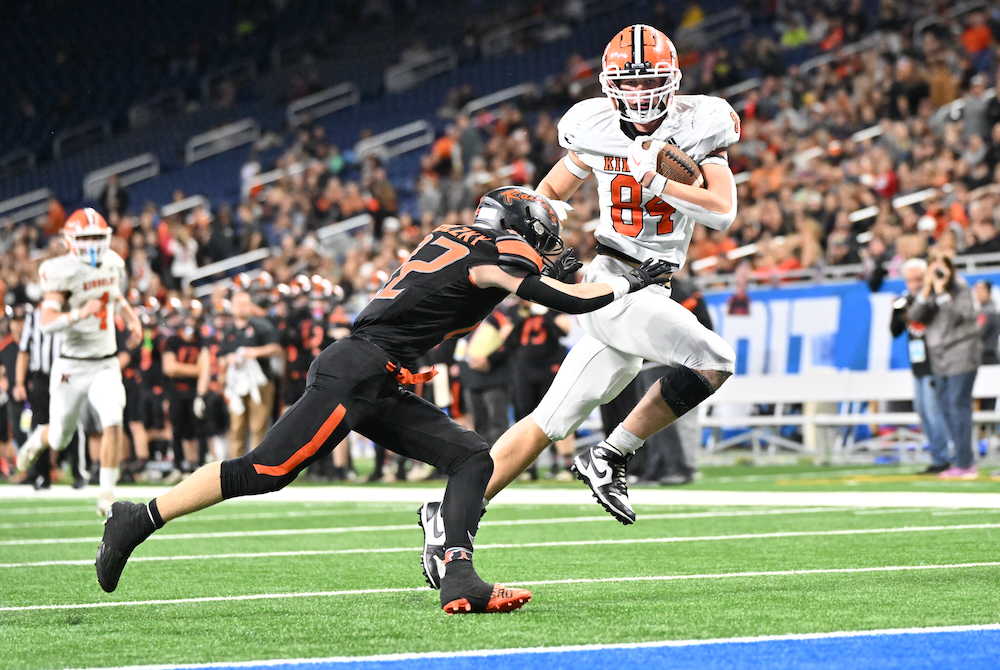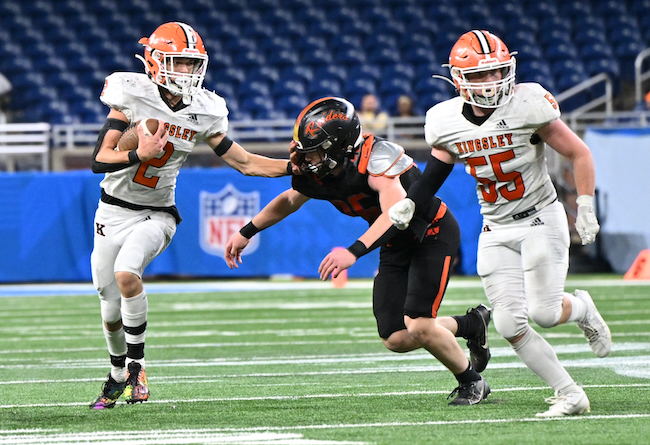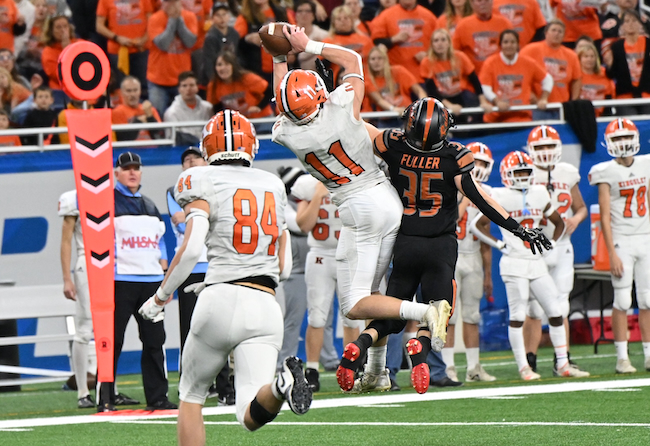
MHSA(Q&)A: NFL official Ronald J. Winter
July 19, 2012
By Brian Spencer
Second Half
 Kalamazoo's Ron Winter has officiated in the National Football League for nearly two decades, and became a referee in 1999. But long before he joined the highest level of the game, he got his start on Michigan's high school fields.
Kalamazoo's Ron Winter has officiated in the National Football League for nearly two decades, and became a referee in 1999. But long before he joined the highest level of the game, he got his start on Michigan's high school fields.
Winter has officiated that sport at all three levels and also high school and college basketball. He's also served as a source of knowledge for officials around the state -- and an example for those hoping to start at the high school level and climb to the pros.
Winter remains registered as an MHSAA official, as he's been for 42 years. An associate professor emeritus of human performance and health education at Western Michigan University, Winter was appointed earlier this month to serve a two-year term on the Governor's Council on Physical Fitness, Health and Sports. The council focuses on increasing physical activity and health improvements.
He served on the WMU faculty first beginning in 1969 and then again from 1992-2008. Winter earned bachelor and master's degrees at Michigan State University.
Did you play any sports in high school or college?
I played football, basketball, baseball, and track in high school. However, once I got to Michigan State University, I started playing lacrosse. A couple guys that lived near me played lacrosse and asked me to come out to throw the ball around. After throwing with them a couple times they asked me to come out for the team. I ended up playing lacrosse for MSU for four years.
How did you decide to choose football as the sport you would officiate?
I started officiating as a student at MSU in their intramural program, officiating touch football and basketball. The next logical step was to then officiate in the high school leagues. From there, I began to proceed to all the different levels.
Are there specific requirements for becoming an NFL official?
The biggest requirement is experience. The progression that I went through went like this:
After officiating high school games, I went to the MIAA (Michigan Intercollegiate Athletic Association). They (MIAA) were looking for people that had 3-5 years of experience at the high school level. From there I went to the Mid-Continent conference. I wasn’t able to go to the Mid-American Conference because I was employed at Western Michigan University.
From there I went to the Big Ten. The Big Ten was looking for people with 5 to 10 years of experience in high school and people that had experience at different positions as an official. I ended up officiating in as a Big Ten football official for 10 years and a Big Ten basketball official for 15 years. I then submitted an application to the National Football League. Coincidentally, the NFL was scouting officials, and had followed me for four years before they finally asked me to be a part of the staff. The NFL decides on who they want to pursue through recommendations and personal interest. They look for personality traits as well as how (officials) carry themselves through different situations.
What has been your favorite level to officiate; High school, college or professional?
I enjoyed officiating all of them, but for different reasons.
I found high school to be the most fascinating because it’s all about the kids; they are playing the game for the love of the game. That is the purest sense of the sport. I loved being involved with kids simply because they love the game.
I found the Big Ten to be most exciting because of the kind of atmosphere that exists on a Big Ten campus on a Saturday afternoon. It’s electric. You don’t get that same sense or the same feel on Sunday afternoon in a pro stadium.
I found the NFL to be most intense. The NFL really has three or four different levels of play during the season. There is preseason play, the first thirdof the season, the second third of the season, and the last five games of the season. Each level is ramped up another notch as the season progresses. Playoffs are entirely different all together. In terms of the intensity and pure speed of the game, there is nothing like the NFL playoffs.
How important is getting along with your fellow officials on the field?
It’s imperatively important if you want to have a smooth and well-run game. This doesn’t mean that you have to buddy-buddy off the field, but on the field you have to be committed to one goal. We spend two or three hours on meetings Saturday afternoon to go over rules tests, tape, and more to prepare for the next game (and) to get over rough patches that develop on a personal level in a previous week. I need to know that the other six guys are focused and thinking about football like me. Everyone has to have confidence in one another. We spend plenty of time on Saturday to get to the point that we need to on Sunday.
What has been the most exciting game you’ve officiated?
I’ve been in plenty of exciting games from NFL playoff games, to the first Orange Bowl game, to the Rose Bowl, to the Division III Hope vs. Calvin basketball game, to when Indiana played Purdue in basketball. All of them were incredible to be a part of. During the Indiana vs. Purdue game, the arena was electric. The players, coaches, fans were intense. Everybody is totally focused on the game. Each coach had a tremendous respect for one another. Neither one wanted to show up or embarrass their counterpart. This game wasn’t that drastically different at the Division III level, however. The intensity of both was very similar.
Are there games that you get excited to officiate more than others, presently?
Not in terms of specific teams. It really just depends on the circumstances, of course. Pittsburgh vs. Baltimore is an intense game. The Jets vs. Patriots game is great. There are clearly rivalries that are very exciting to be a part of. The level of play and intensity of the athletes in the NFL is unmatched and can provide excitement every week.
What is the most difficult aspect of being a NFL official?
I would say that preparation and being able to maintain intensity on the field on Sunday are key aspects. The preparation is difficult because it’s time-consuming. It is a misconception that we simply show up on Sunday to work the game. By the time Sunday rolls around, I’ve spent over 20 hours during the week trying to prepare for a Sunday game. It isn’t hard in terms of physical labor, but difficult in terms of a time commitment. You have to have an understanding family to be in the occupational field that I am in.
Do you have any advice for aspiring officials who hope to make it to the league?
Practice, practice, practice. Be able to work any game at any level and get as much experience as you can. Be a good partner on the field. It takes time; it isn’t something that just happens. Like anything else, it takes practicing your trade to be able to make it to the top level.

Inspired by Past, Kingsley Adds to Tradition with 1st Championship since 2005
By
Scott DeCamp
Special for MHSAA.com
November 25, 2023
DETROIT – When Kingsley head football coach Tim Wooer was presented the MHSAA Division 6 championship trophy Saturday night at Ford Field, he turned, raised it over his head, and acknowledged the roaring throng of orange-clad Stags fans in the stands.
Community, tradition, and history mean everything to the 1998 Kingsley alumnus.
All of those things were recognized and on display during and after Kingsley’s 38-24 victory over Almont, which secured the Stags their second Finals championship and first since 2005.
Kingsley senior Eli Graves made history in his own right. He rushed for 210 yards and four touchdowns, plus he accounted for three two-point conversions, for a total of 30 points to tie the all-division 11-player Finals record for points in a game by one player.
“We have the best O-line in D6, so it’s pretty easy to run behind those guys,” Graves said. “When they get the job done, it makes my job easy. And I’ve just got a coach that trusts me with the ball.”
Wooer believes in his players, present and past. They share a special bond, which was apparent during the postgame press conference after Kingsley put a memorable finish on its 12-2 season.
 Graves was one of four Stags players Wooer brought to the postgame press conference. Wooer also brought assistant coach Connor Schueller, a fullback on the 2021 team, whose mother Trina Schueller died from COVID-19 in October 2021.
Graves was one of four Stags players Wooer brought to the postgame press conference. Wooer also brought assistant coach Connor Schueller, a fullback on the 2021 team, whose mother Trina Schueller died from COVID-19 in October 2021.
“I think the reason I’ve got him in here tonight is because sometimes as a coach – and this is true of (the late) Justin Hansen, too – there’s a shift of where you’re supposed to be the role model,” an emotional Wooer said, pausing to collect himself. “You’re supposed to be the role model for players, you’re supposed to teach them everything.
“And then there comes a time when your players teach you about life. And Justin Hansen did that for sure, and so did Connor Schueller. Two pretty important people in our lives in our community.”
Hansen was a captain on Kingsley’s 2002 conference championship team. He was a special-ops Marine, who was killed in action in July 2012.
On Saturday, Wooer wore a red T-shirt with the letters “USA” on the front and the name “Hansen” on the back.
“It’s truly taken me about 10 to 11 years to be able to talk about it. But I can remember as I driving out of town that evening, crying and sobbing and being angry and having all these emotions, I wanted to make sure that he was always remembered,” Wooer said, his eyes welling up before a momentary pause to compose himself. “So he was here today, and he was remembered.”
Graves put on a performance that will not soon be forgotten. The wiry 6-foot-3, 175-pounder scored on TD runs of 3, 30, 5, and 6 yards.
Graves tacked on a pair of two-point conversion runs, and he hauled in a two-point conversion pass with some fine footwork along the sideline.
“He’s a good player downhill. Not much to say about it,” Almont senior Ayden Ferqueron said. “The wing-T is hard to stop. When you’ve got a running back that goes downhill and able to follow his blocks, see holes, and hit them (it’s tough to stop).”
Kingsley outgained Almont in total yards (371-191), holding a big advantage in rushing yardage (331-174) and an edge in its timely passing game (66-17).
Stags junior tight end Chase Bott caught a 35-yard TD pass from senior Gavyn Merchant, and senior Skylar Workman ran in the two-point conversion for a 30-17 lead eight seconds into the fourth quarter.
Almont hung around throughout the game, pulling within 30-24 on senior Cole Walton’s 35-yard TD pass from senior Chase Davedowski and sophomore Sean O’Neil’s PAT with 7:55 remaining.
 But every time the Raiders pulled within striking distance, the Stags had an answer and it usually came from Graves, who put it away with his final TD run with 2:19 left.
But every time the Raiders pulled within striking distance, the Stags had an answer and it usually came from Graves, who put it away with his final TD run with 2:19 left.
Almont, which was making its first Finals appearance since 2019 and looking for its first title, finished with a 12-2 record.
“Nothing that we didn’t prepare for. They were just more physical off the ball than us,” Almont coach James Leusby said. “Defensively-wise, we got pushed back a little and hadn’t faced that all year, so hats (off) to them.”
Almont senior Chase Battani scored on a 65-yard TD sprint, while Ferqueron ran for a 2-yard score. Ferqueron and Battani led all defensive players in the game with 15 and 13 stops, respectively.
Graves said he wore jersey No. 2 for his brother, Owen Graves, who was part of Kingsley’s 2020 team that had to forfeit in the playoffs because of COVID.
Eli Graves said he did not get the chance to see his brother after the game, but added he’ll probably brag to him about his performance once he sees him. He knows his brother is proud.
“He never got to finish his senior season because they had to forfeit due to COVID, so we always play our hardest for that team because they didn’t get a chance to do this,” Graves said.
Wooer was the architect who helped build Kingsley into the program it has become. His 2005 team defeated Monroe St. Mary Catholic Central, 31-21, for the Stags’ first championship.
Wooer left Kingsley and coached at Traverse City West for a decade before he returned to his alma mater in 2018.
For coaches, comparing state-title teams is like comparing one’s children. You love them all the same.
“They’re both fun,” Wooer said with a chuckle when asked to compare Kingsley’s two title winners. “I would say, people have asked me that question in terms of, ‘Which team was better? How were they similar? How were they different?’
“I think the one characteristic when you get a team of this caliber is the character and the morals and the ethics and just the leadership. When I was 24 years old, it was all about having the biggest, fastest, strongest kids. And the longer I coach, the more I understand that having guys like this lead your team is the magic potion.”
PHOTOS (Top) Kingsley’s Chase Bott (84) makes his move toward the goalline while Chase Battani works to wrap him up Saturday at Ford Field. (Middle) Eli Graves (2) follows teammate James Pearson upfield. (Below) Max Goethals (11) pulls in a pass for the Stags. (Photos by Hockey Weekly Action Photos.)

